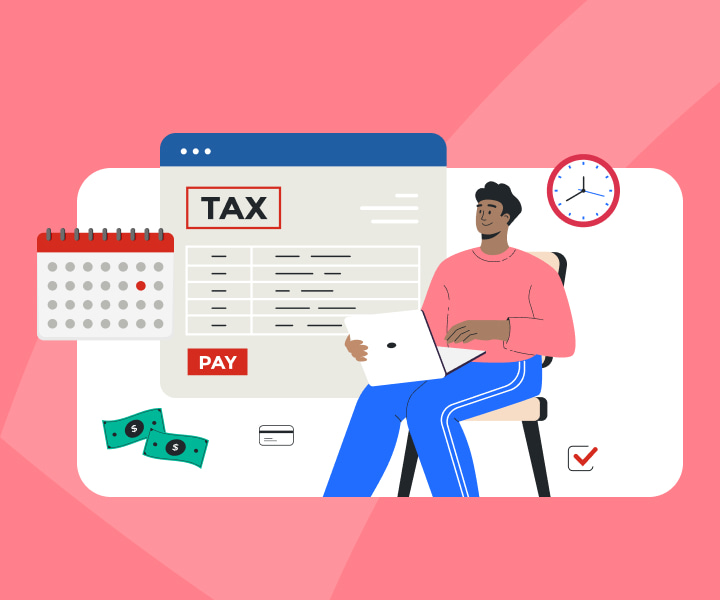Canadians are Feeling Tax Burnout: 5 Ways to Keep More of Your Hard-Earned Money
TurboTax Canada
July 30, 2025 | 3 Min Read
Updated for tax year 2025

If you're feeling the squeeze, and not in a good Spanx kind of way, you’re not imagining things. According to Fraser Institute’s Canadian Consumer Tax Index 2025, the average Canadian household shelled out a whopping 42.3% of their income in taxes during 2024—more than they spent on housing, food, and clothing combined. That’s a major jump from just 33.5% from 60 years ago, when necessities gobbled up most household spending.
According to the study:
- Canadians paid $48,306 in total taxes in 2024 on an average household income of $114,289.
- Since 1961, tax bills have soared a staggering 2,784%, far outpacing cost increases in housing (2,129%), food (927%), and clothing (460%).
So yes, believe it or not, taxes rank as your biggest household expense. That’s a huge incentive to think about how you can save as much money as you can on that tax bill.
Canadians are feeling the weight
“Seeing nearly half your income go to taxes is staggering—even more so when you compare it to daily essentials. Understanding deductions and credits is your first line of defence—just like you might take time to shop around when considering a big purchase, understanding the basics of taxes will save you money throughout your life.
5 smart ways to save on your taxes
It’s not how much you make, it’s how much you get to keep. Here are five top tips for Canadians to start keeping more cash at tax time:
1. Maximize Registered Retirement Savings Plan (RRSP) contributions
RRSP contributions are used to lower your taxable income, and then are taxed when withdrawn as income later. Used wisely, you can deduct in a year when you have higher income and withdraw in a year when your income is lower, usually after retiring. The result being less tax paid on that income in the end.
2. If you are saving for a house, contribute to a First Home Savings Account (FHSA)
Just like an RRSP, your contributions to an FHSA are tax deductible, lowering your taxable income and saving you money at tax time. There are criteria to meet, but, generally with the purchase or build of a new home, the withdrawals are tax-free, making this a very tax-efficient way to save and invest to grow your money for the future.
3. Claim all available tuition and education credits
If you paid tuition to a post-secondary institution, tuition and education tax credits can help to reduce the amount of tax you owe. You can claim the amount of tuition in a given year, or only what you need, to reduce your taxes owing. As a non-refundable tax credit, this won't create a refund, however. But any tuition amounts not needed in a current year may be transferred to another qualifying individual, or carried forward for your own use in a future year.
4. Work-from-home? Claim home office expenses
Even a modest claim for internet or utilities adds up—especially when remote and hybrid work are here to stay. To claim these office expenses, you’ll need a T2200 from your employer stating that a home office is a necessary part of your employment, then you can claim a portion of those expenses proportionate to the part of your home that your home office occupies. For example, if your home office takes up 10 percent of the square footage of your home, you can claim 10 percent of utilities, insurance, and property tax. If you are self employed you can also deduct some of your mortgage interest.
5. Keep organized year-round
That envelope of receipts in your junk drawer? Sort it now. Clarity at tax time means more refund—and less stress. TurboTax’s receipt tracker on the app helps you to input those receipts year-round, such as medical receipts or business expenses. Then come tax time, you are ready to hit the ground running, and nothing is missed.
Taxes are climbing—and 2025’s data shows they may now exceed necessities for Canadian households.
Just a few tweaks to your financial picture can mean saving a significant amount in taxes. With increased government spending on the horizon, taxes could continue to rise. Making changes now can mean thousands in savings over the long haul.
TurboTax Canada isn’t just about DIY tax submissions. TurboTax can help you uncover every benefit and deduction you are entitled to and maximize your refund.
Canadians are feeling the weight
5 smart ways to save on your taxes
1. Maximize Registered Retirement Savings Plan (RRSP) contributions
2. If you are saving for a house, contribute to a First Home Savings Account (FHSA)
3. Claim all available tuition and education credits
Related articles

© 1997-2024 Intuit, Inc. All rights reserved. Intuit, QuickBooks, QB, TurboTax, Profile, and Mint are registered trademarks of Intuit Inc. Terms and conditions, features, support, pricing, and service options subject to change without notice.
Copyright © Intuit Canada ULC, 2024. All rights reserved.
The views expressed on this site are intended to provide generalized financial information designed to educate a broad segment of the public; it does not give personalized tax, investment, legal, or other business and professional advice. Before taking any action, you should always seek the assistance of a professional who knows your particular situation for advice on taxes, your investments, the law, or any other business and professional matters that affect you and/or your business.









